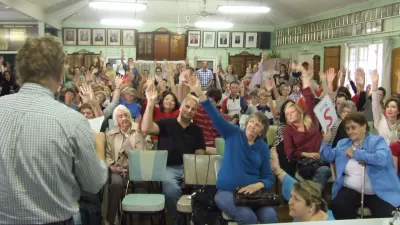Online reviews aren't representative of overall neighborhood populations, but they can reveal data that otherwise might go unnoticed during research phases of planning processes.

Charlotte Hsu shares new research that makes the case for allowing space for online reviews in planning processes.
Every day, people share a dizzying amount of information about local communities online. They talk about whether their neighbors are friendly, how well the buses run, what kinds of restaurants are in an area, and much, much more.
A new study by University at Buffalo researcher Yingjie Hu shows how we can sort through this vast trove of digital data to improve cities and people's quality of life.
The study, published by the Annals of the American Association of Geographers, posts on the site Niche.com to search for insights about public opinion.
"The goal was to efficiently sort through thousands of opinions to learn about people's perceptions of their communities," explains Hsu. "The study combined spatial analysis, machine learning and natural language processing techniques to identify features of neighborhoods that people talked about online, and what reviewers' general feelings were about those attributes."
So, can online reviews help planners spot insights into public opinion they might otherwise miss? According to researchers, data harvesting can complement traditional methods of public engagement and research.
FULL STORY: How online neighborhood reviews could aid urban planning

Planetizen Federal Action Tracker
A weekly monitor of how Trump’s orders and actions are impacting planners and planning in America.

San Francisco's School District Spent $105M To Build Affordable Housing for Teachers — And That's Just the Beginning
SFUSD joins a growing list of school districts using their land holdings to address housing affordability challenges faced by their own employees.

The Tiny, Adorable $7,000 Car Turning Japan Onto EVs
The single seat Mibot charges from a regular plug as quickly as an iPad, and is about half the price of an average EV.

Seattle's Plan for Adopting Driverless Cars
Equity, safety, accessibility and affordability are front of mind as the city prepares for robotaxis and other autonomous vehicles.

As Trump Phases Out FEMA, Is It Time to Flee the Floodplains?
With less federal funding available for disaster relief efforts, the need to relocate at-risk communities is more urgent than ever.

With Protected Lanes, 460% More People Commute by Bike
For those needing more ammo, more data proving what we already knew is here.
Urban Design for Planners 1: Software Tools
This six-course series explores essential urban design concepts using open source software and equips planners with the tools they need to participate fully in the urban design process.
Planning for Universal Design
Learn the tools for implementing Universal Design in planning regulations.
Smith Gee Studio
City of Charlotte
City of Camden Redevelopment Agency
City of Astoria
Transportation Research & Education Center (TREC) at Portland State University
US High Speed Rail Association
City of Camden Redevelopment Agency
Municipality of Princeton (NJ)





























